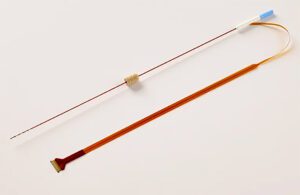
Dr. William Bingaman performed the procedure with the electrode — exclusively marketed by Zimmer Biomet — at Cleveland Clinic. It marks the first procedure to utilize NeuroOne’s Evo sEEG with Zimmer Biomet’s Rosa One Brain.
The Rosa One Brain, a robotic platform, assists surgeons in planning and performing complex, minimally invasive neurosurgical procedures.
Eden Prairie, Minnesota-based NeuroOne commercially launched its Evo sEEG electrode line in the U.S. earlier this month. The electrodes provide up to 30 days of recording, monitoring and stimulation of electrical signals at the subsurface level of the brain.
NeuroOne’s electrodes provide a similar function at the subsurface level of the brain compared to cortical electrodes. However, they utilize a much less invasive process. That process eliminates the need to remove the top portion of the skull.
Both NeuroOne’s Evo Cortical and sEEG electrodes feature hi-definition, thin film electrodes. They potentially increase signal clarity and reduce noise, the company said. The electrodes also offer better tactile feedback during insertion into brain tissue.
“This clinical case utilizing our minimally invasive and high-definition electrode technology with Rosa One Brain is a major milestone in NeuroOne’s partnership with Zimmer Biomet,” said NeuroOne CEO Dave Rosa. “Now that Zimmer Biomet has commenced U.S. distribution of our Evo sEEG electrodes, this case study confirms the synergistic use of our product with Zimmer Biomet’s robotics platform which was the foundation of our interest to partner with Zimmer Biomet.”
Evo sEEG previously held clearance for up to 24 hours of use and, in August, NeuroOne submitted a special FDA 510(k) application to extend use to up to 30 days. The FDA cleared the Evo sEEG electrode for 30-day use last month.

